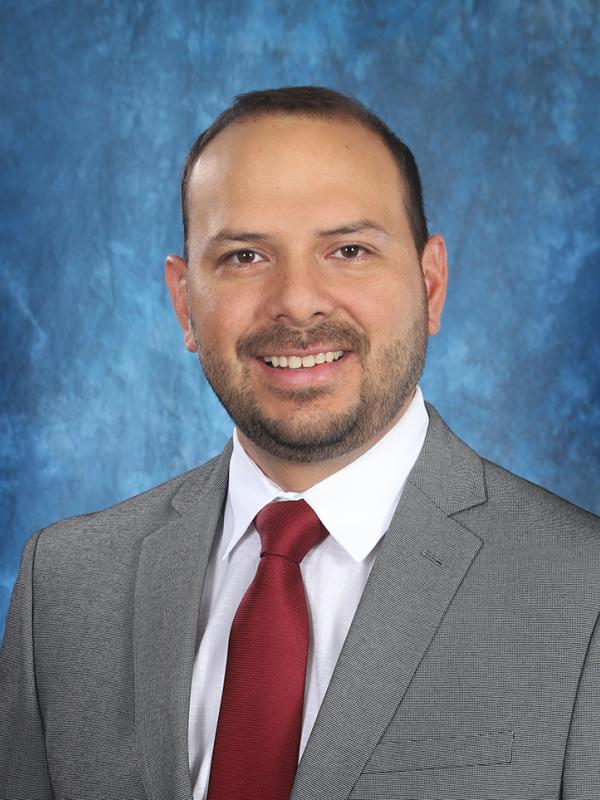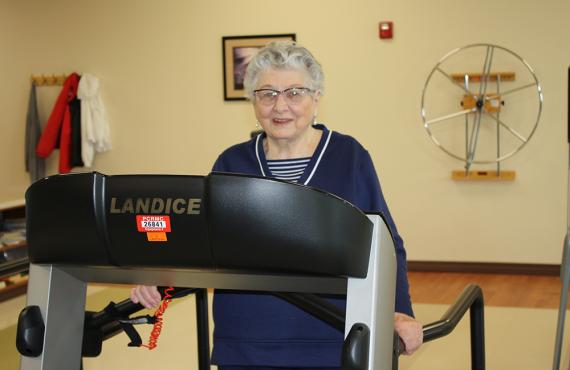Published on October 4, 2021
Read Time: Eight Minutes
Thomas Guerrero-Garcia, MD, a medical oncologist and hematologist with the Phelps Health Delbert Day Cancer Institute (DDCI), and Paige Marsolais-Heitman, director of marketing and public relations at Phelps Health, talk about cancer biomarkers on KKTR’s Ask the Professionals radio show.
What are cancer biomarkers? How are they used?
Dr. Guerrero-Garcia: “Twenty or thirty years ago, the way cancer doctors treated a patient was with…chemotherapy. Now, we have come to more of a personalized kind of medicine, and this is actually the background of biomarkers. We better understand the cancer biology, and by doing that, we [can] treat patients differently. Even though they might have the same type of cancer, we treat them differently.

“Essentially, a biomarker is a biological molecule that one can test either in the tumor itself or as part of your unique DNA characteristics. We were not doing that before, and now we're doing it. That gives us a chance to personalize the treatment or target the type of therapy to a particular patient, even though they might have the same type of cancer. One can imagine having…five lung cancer patients and each of them having a unique treatment that would perhaps be more precise and [have] better outcomes.
“Biomarkers [are] biological molecules that we're trying to figure out [and trying] to understand. There's many ways of biomarker testing that will allow us to really target [a] particular abnormality if it's found [and if it’s a] significant…part of the growth of that particular cancer. There are many biomarkers: DNA, RNA, protein, enzymatic pathways.”
How do you determine someone's biomarkers? Is testing for biomarkers invasive?
Dr. Guerrero-Garcia: “We…obtain a biopsy to make a diagnosis of cancer. After that tissue is provided, we can now use the technology that we're using…and do the biomarker testing right there. The patient does not need another procedure. The patient does not need other testing.
“Unfortunately, [there are] cases where we cannot obtain a biopsy because it's very difficult. Also, we consider the patient’s preference, as well, and they [may not] want to get another procedure that might involve complications. In our clinic and here at Phelps Health, we could do it [biomarker testing], and it's very simple. It's a simple blood draw. [It] doesn't involve a procedure. It [blood draw] will give us what we want.
“When the technology [for biomarker testing first came out], we [often had to] wait for the results for a month initially. Now, that [timeframe has been reduced] to two weeks. Some companies [have] streamlined the process of getting your result in seven days. That is the most exciting part of these biomarkers.”
What are the focus areas of cancer biomarker research?
Dr. Guerrero-Garcia: “What it [cancer biomarker research] comes down to is trying to figure out how we can open up new treatment [options] for patients. [In some instances, we] have got to the point in which a treatment has really failed them [patients], and we want to open more new pathways of treatment.
“The biomarkers are including new mutations that we haven't understood [with] that patient or that type of cancer. Now with this technology -- obviously not in all patients, because sometimes we just don't discover them [mutations], but in the ones [where] we discover them -- that definitely brings an opportunity to [try] a market drug that is out there.
“[Research also may] open up particular clinical trials or an experimental way of treating that patient. You can only do that if you discover the biomarkers. That's why it's…so important nowadays to get biomarkers and understand the cancer biology in a better way.”
What is the relationship between biomarkers and immunotherapy?
Dr. Guerrero-Garcia: “We also now test the relationship between the tumor and the immune system, and that has brought, for example, a revolutionary treatment of cancer, which is immunotherapy. The biomarker known as PD-1 or PD-L1 is tested…to know, for example, responses to immunotherapy. You want the biomarker to know where immunotherapy can be deployed in a patient.
“That's an example of what we're doing right now -- getting a biomarker first to understand where we could deploy immunotherapy as opposed to regular chemotherapy, which has never had a true biomarker or a specific pathway that we were interested in before treating the patient.
“Understanding [a patient’s biomarkers] prior to giving [a patient] that treatment recommendation is so critical and important. It might benefit [the patient] in the long run, if you get the biomarkers to understand how your cancer is behaving.”
Do all cancers have biomarkers?
Dr. Guerrero-Garcia: “There will be some cancers that we unfortunately haven't opened up our understanding very well. My best guess is the answer will be yes [all cancers have biomarkers]. We just don't know them all.”
When are biomarkers used? Does it depend on the stage of cancer?
Dr. Guerrero-Garcia: “We use biomarkers in many situations. We use biomarkers to know what we're going to expect down the line in terms of treatments or we could use the biomarker right away. It all depends on what type of cancer we have. It all depends on what type of treatment we're looking to deliver. We use [biomarkers] in different stages.
“We like to ask for the biomarker sometimes early on. That's just because as oncologists, we like to plan for things -- not just for the treatment that we're immediately giving you, but down the line. We want [to be] ahead of the game, so that we know strategies of treating patients early on instead of just waiting until the end.”
Do biomarkers show the progression of cancer?
Dr. Guerrero-Garcia: “Absolutely. [There is] a mutation [of] the gene called TP53. If you search [for TP53] you will find out really not good news, because that's a particular biomarker and gene that we know in cancer doesn't bring good outcomes.
“If you find that, you start looking at what's going to be your strategy going forward with that patient with that particular biomarker, because you know that it's going to be hard to treat. Knowing that from the get-go, it brings to my mind my strategies from the time I talk to a patient and tell them what we're going to expect out of these treatments.”
For what types of cancer do we have the most biomarker information?
Dr. Guerrero-Garcia: “I'll give you an exciting example; it's prostate cancer. In the advanced stage [of prostate cancer, there is a] particular gene…that repairs DNA. The way it works is normally cells are dividing. As the cells are dividing, they can actually be prone to errors. You have a particular gene that is monitoring that…and if that gene is not repairing that, well, [those cells are] going to grow abnormal.
“We have a particular enzyme that actually will target that pathway and eventually will kill cancer in that way. We can test that [biomarker] in prostate cancer, and [use] a drug called a PARP inhibitor, which is targeting that enzyme.”
How is treatment using biomarkers different from other forms of cancer treatment, like radiation therapy?
Dr. Guerrero-Garcia: “Cancer treatment is multidisciplinary. We cannot ignore the fact that we still need radiation therapy for many of our patients with cancer. Sometimes the issue is not extensive but actually a localized problem of the cancer.
“That's when radiation [oncologists] become essential to our partnership. It's very important to have them onboard, to talk to them and to figure out if radiation would be part of the treatment, as well. We still use radiation in many cancers, and I think it still has an important role in our cancer treatment pathway.”
Are cancer biomarkers currently being used at Phelps Health?
Dr. Guerrero-Garcia: “We have the technology. We're using it. [We can get results] within seven days if we use the liquid tumor biopsy. It will give us the biomarker, and we will happily discuss the results with the patient within seven days at Phelps Health. I think the patients -- when we talk to them -- are really in shock because they cannot believe that we're going to tell them their treatment options.”
What should patients ask their doctor about biomarker testing?
Dr. Guerrero-Garcia: “They can [ask their oncologist], ‘How well do we understand [my] cancer? How well do we know that there's more than chemotherapy as an option?’ When a patient…receives a cancer diagnosis, probably the first thing that comes to mind [is that the] treatment is…just going to be the old ways of traditionally treating cancer, which is chemotherapy. That’s not to say it doesn’t work because we still use it.
“In lung cancer, when immunotherapy and these biomarkers [were discovered], immunotherapy was almost [going to stop the need for] chemotherapy. Then, we tested them [immunotherapy and chemotherapy] together. It was a good thing [and they] actually worked even better. That's why chemotherapy still has a role [in treating lung cancer].”
What are the latest updates on cancer biomarker research? How does this research affect patients at Phelps Health?
Dr. Guerrero-Garcia: “In the area of biomarker [research], cellular therapy has become the blooming way to treat many cancers. Cellular therapy is something that I think hopefully will come to the community, and hopefully, we'll see it at Phelps Health. Right now, [cellular therapy is] still [being researched].
“Cellular therapy comes down to basically understanding the mechanisms of how to use the immune system to fight cancer. Because it's targeted and because we're using your immune system, that's how cellular therapy is going to be different from our traditional therapy, such as chemotherapy.”
For More Information
Learn more about cancer care at Phelps Health.

